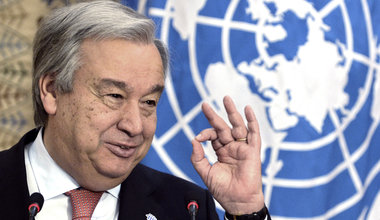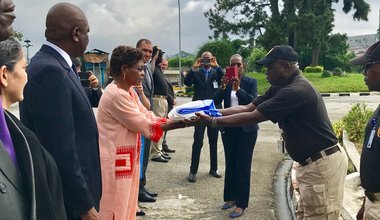Daily Brief on Cote d’Ivoire for Wednesday, 18 June 2008
Highlights
-FAFN ex-combatants demonstrate again in Bouaké
-Four generals discuss DDR issues
Protest
Disgruntled demobilized ex-combatants of the Armed Forces of the Forces Nouvelles (FAFN) demonstrated again today in Bouaké. They were protesting again about the non-payment of their monthly allowance of 90,000FCFA (approx $200). The commercial centre of the city was paralysed for a few hours before the Zone Commander Ousmane Chérif, was able to bring the situation under control. Unfortunately, criminals took advantage of the confusion and several cases of robbery and car theft have been reported.
DDR
A meeting of the four Force Commanders, Generals Fernand Amoussou of UNOCI, Clément-Bolé of Licorne, Soumaila Bakayoko of the FAFN and Philippe Mangou of the Defence and Security Forces of Côte d'Ivoire (FDSCI)) was held in Yamoussoukro today to discuss the regrouping of former FAFN soldiers within the framework of the on-going DDR process. The meeting is an attempt to try to find solutions to the problems the DDR process on the FAFN side is facing.
Arms embargo
Arms embargo inspections were yesterday successfully carried out by UNOCI peacekeepers at the FAFN units in Doropo (north), Bouaké (centre) and Kaniasso (north), and at its checkpoints in Vavoua (west). On the same day a similar inspection was carried at the Defence and Security Forces of Côte d'Ivoire's (FDSCI) gendarmerie brigade in Tai (west) and at its cantonment site in Tabou (south).
Human Rights
During his week-long visit to evaluate the human rights situation in the north and western regions of Côte d'Ivoire, the Chief of the Human Rights Division, Mr. Simon Munzu met with local administrative authorities in Bagohouo (west) who raised concerns over the circulation of a large number of weapons, which they felt could jeopardize the electoral process. The sous-préfet also requested the Human Rights Division's assistance in putting an end to major human rights violations in the region such as inter-community conflict over land tenure, ethnically-motivated killings, attacks by unidentified highwaymen, gender-based violence including, female genital mutilation and rape.
 ONU
ONU Nations Unies Maintien de la paix
Nations Unies Maintien de la paix



